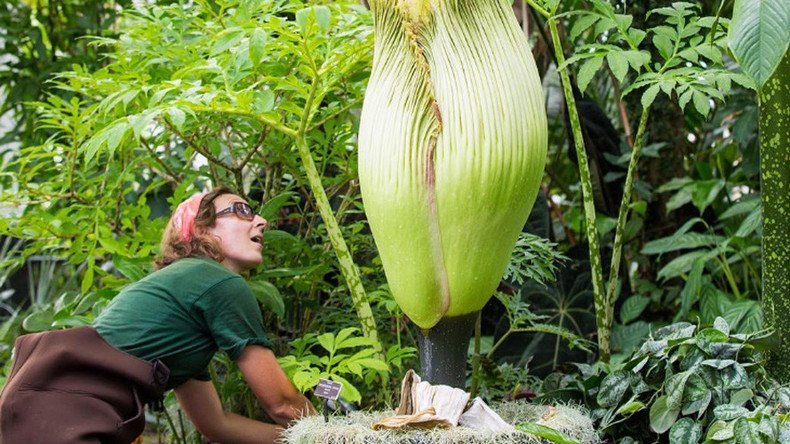A rare ‘corpse flower’ is blooming in New York and it stinks (VIDEO, PHOTOS)

A flower that smells like death and only blooms once a decade is flowering in New York, and its stink is causing a stir.
The corpse flower smells like someone stuffed a dirty sock with dog poop & rotten fish! @NYBGpic.twitter.com/oh7mBs1tft
— Dustin Growick (@DustinGrowick) July 29, 2016
The Amorphophallus titanum, or corpse flower, is a rare plant that’s more famous for its strong smell than its petals.
@IUBloomington#wallywatch Enjoying our "smelly" visit with Wally the corpse flower! pic.twitter.com/dbvJ2mXOcP
— Nicole Wilkins (@nnwilkin) July 30, 2016
When its leaves open dark red petals are revealed, along with pungent odor, which is said to smell like a rotting body.
One New Yorker described the scent as being like “a hot, trash day in Brunswick,” while another likened it to “vomit.”
The corpse flower is blooming at the New York Botanical garden. During blooming, its temperature increases to that of a human body, in order to spread the scent, which is used to attract pollinators like beetles and flies that are attracted to dead animals.
The plant, native to Sumatra in Indonesia, takes years to store enough energy to raise its temperature.
Amorphophallus titanum, which means “giant misshapen penis,” got its name as a result of its shape. It can grow to 10 feet.
@beatdarwin Decidedlly fishy. There’s a sweet spot for it because of the air movement in the Conservatory.
— NY Botanical Garden (@NYBG) July 29, 2016
The New York Botanical Garden corpse flower has been at the garden since 2007, and a live stream of the flower blooming began on July 21.
What’s strange about this particular bloom is that it is one of several corpse flower blooming’s across the US that have happened recently, or are about to take place, which is baffling scientists. Some suggested the plants might be relatives.












